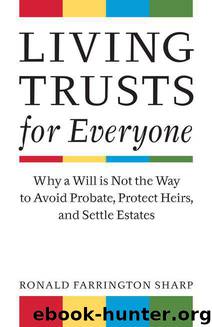Living Trusts for Everyone: Why a Will Is Not the Way to Settle Your Estate by Sharp Ronald Farrington

Author:Sharp, Ronald Farrington [Sharp, Ronald Farrington]
Language: eng
Format: epub
Publisher: Skyhorse Publishing
Published: 2010-04-22T04:00:00+00:00
INSTRUCTIONS TO YOU
AS THE GRANTOR AND TRUSTEE
Operation of your trust is quite simple.
TAXES
There are no separate tax numbers necessary (see Employer Identification Number in the glossary). You file your taxes just as you always have in the past without reference to the trust. There is no trust tax return required unless, at the death of a grantor, the trustee is to take over and continue for the benefit of a trust beneficiary.
BANKING
Once your bank and credit union accounts are either in the name of the trust or have a pay-on-death designation filed for them, you do nothing different from what you did before. Your checks do not have to have the name of the trust imprinted upon them, even though the account is in the name of the trust. You do not have to write the word “trustee” after your signature. See the section on accommodation signatures below if you want to give someone else the permission to use the account on your behalf.
REAL ESTATE
The sale or mortgage of real estate operates in exactly the same fashion as before, except if the deed to the trust has been recorded, the name of the seller is the trust and you sign as trustee. The buyer or his title company may require an affidavit from you stating that the trust is still in operation and that you have the authority to sell the property. Upon your death, the successor trustee can immediately assign the property of the trust to the heirs as you have instructed (after paying all your debts, taxes, and other expenses, of course). No probate court directives are necessary. The death certificate is normally recorded with the county deeds records.
NEWLY ACQUIRED ASSETS
Don’t forget as time goes by that you have a trust. If you buy new real estate, get a deed made to the trust for the new property. Do the same when opening new accounts or acquiring any new titled assets. These must be funded to the trust in order to keep them out of probate. The pour-over will, described previously, will guarantee that these new assets end up in the trust after the pour-over will is probated, but probate avoidance is a major benefit of your trust and it is up to you to see that the trust stays funded.
CHANGING YOUR MIND
Trusts are easily changed. Much more easily, in fact, than wills. To change a will, you need to sign a codicil. This is a written amendment to the will that must be signed with the same statutory formality of the will itself, which may mean having two disinterested witnesses and in some cases a notary. Changing a trust in most states can be done merely by signing a dated, written statement explaining what you are changing. In some states the trust amendment does not even have to be witnessed or notarized, though as a way of avoiding a fight over whether you actually signed the document or whether you were competent when you did it, I recommend having witnesses and notarizing.
Download
This site does not store any files on its server. We only index and link to content provided by other sites. Please contact the content providers to delete copyright contents if any and email us, we'll remove relevant links or contents immediately.
International Integration of the Brazilian Economy by Elias C. Grivoyannis(57420)
The Art of Coaching by Elena Aguilar(50142)
Flexible Working by Dale Gemma;(22956)
How to Stop Living Paycheck to Paycheck by Avery Breyer(19223)
The Acquirer's Multiple: How the Billionaire Contrarians of Deep Value Beat the Market by Tobias Carlisle(11684)
The Radium Girls by Kate Moore(10929)
Thinking, Fast and Slow by Kahneman Daniel(10640)
The Art of Thinking Clearly by Rolf Dobelli(8878)
Hit Refresh by Satya Nadella(8347)
The Compound Effect by Darren Hardy(7586)
Atomic Habits: Tiny Changes, Remarkable Results by James Clear(7244)
Turbulence by E. J. Noyes(7062)
Tools of Titans by Timothy Ferriss(6978)
How to Be a Bawse: A Guide to Conquering Life by Lilly Singh(6708)
Change Your Questions, Change Your Life by Marilee Adams(6668)
Nudge - Improving Decisions about Health, Wealth, and Happiness by Thaler Sunstein(6648)
Win Bigly by Scott Adams(6330)
The Black Swan by Nassim Nicholas Taleb(6213)
A Court of Wings and Ruin by Sarah J. Maas(6125)
